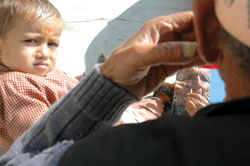|
|
| MIRROR IMAGE: Balaram Poudel shaves one morning last week in Hetauda while his grand-daughter looks on. His family was chased out of Bijayapur in Rautahat after receiving threats from JTMM activists last month. He and other internally displaced pahadis are now living with relatives in Hetauda. |
A madhesi insurrection is being discussed in a small hotel room in a town two hours from the Nepal border.
Chandrashekhar, the newly appointed head of Jwala Singh's intellectual front, Tarai Buddhijivi Mukti Morcha, and Arjun Singh, head of the student front, look thrilled. They have just got news from an FM station about the assassination of a political target in Parsa by their cadre. The two immediately call up their district chief to congratulate him. "Ek do aur patkaiye," one of them says.
Jwala Singh' s JTMM has given its local units the authority to attack pahadis. Ask its leaders why they do not go after symbols of the state, and Chandrashekhar responds: "But the pahadi is the symbol of the state. We want madhesi self-rule."
It is clear extremists in the tarai want to deepen the polarization, and believe that tit-for-tat attacks on madhesis or aggressive state security deployment would benefit them.
Jwala has emerged as the most powerful armed group in the tarai, claiming a strength of 25,000 which is clearly a gross exaggeration. But others say they do have about 500 people each in several of the sensitive districts as active cadres and part time sympathisers. "Kathmandu thinks these are rag tag groups of 20-25 people,"complains a Janakpur police official, "but several villages are dominated by them."
Besides Jwala's JTMM, the other militant groups are Goit's JTMM, the Samyukta Janatantrik Mukti Morcha (SJMM) headed by Pawan aka Prahlad Giri, and the Madhesi Mukti Tigers of Praful Yadav. Bisfot Singh's group has merged with SJMM.
There is increasing collaboration between all of the armed groups. Chandrashekhar asked Manager, a SJMM leader, to help him get an Indian SIM card and promised a Nepali SKY phone in return.
Jwala's activists say they want an autonomous single Madhes, and an election without such a commitment is meaningless. Chandrashekhar says, "It is their CDO, their SP, their election system. Only pahadis will win. Kathmandu doesn't want polls but if they go ahead, we will unleash a killing spree. It will be like Kashmir or Iraq."
The leadership of armed groups is based largely here in North Bihar, while district heads keep moving back and forth across the border. Jwala himself travels around the Indian towns of Darbanga, Muzaffarpur, Hajipur, Samastipur, Madhubani, and more recently, Gorakhpur.
JTMM activists say they are careful not to carry arms in India and face little problems here. "The local people and leaders are with us, and the SSB is neutral," said one. Local support for the JTMM is visible. A passenger on a bus tells us: "We are fully with madhesi groups. We are the same and this is their fight against slavery."
It may not be accurate to dub the tarai armed groups as "criminal" since they have a symbiotic relationship with the politicians. Criminals are learning political nuances, and politicians accept crime for organisational benefit.
While the cadre largely comprises of young, ill-educated people, some politically committed activists have joined the armed movement. Chandrashekhar had an NGO in a Tarai town, and did relief work during the madhes movement. Student leader Arjun Singh, a graduate, is the son of a Kathmandu based madhesi professional. Rajan Mukti, a Saptari activist, is the son of a doctor who studied commerce in Kathmandu.
They all belonged to mainstream groups and now appear to have found a cause that gives them a sense of purpose, solidarity, and adventure. The caste mix of Jwala's JTMM is largely Dalit and non-Yadav upper and intermediate castes.
However, many are also using armed groups as a cover for criminal activities and personal benefit. Jwala Singh initially gave permission to many activists, often within the same district, to carry out arthik karabahi. A spate of extortion and killings followed, often of madhesis, breeding resentment.
At a recent meeting of his district chiefs, Jwala Singh asked them not to harass madhesis anymore, reportedly saying: "Madhesi people will slap us if we don't change."
But it hasn't been easy because the command structure is hollow, leadership is inexperienced and the organisation needs money. There is no ideological program or a clear work plan and activists have gotten used to the easy route.
Toofan Singh Bidrohi, Siraha-in-charge of the JTMM, is despondent. Police action and infighting have caused losses. "We tried to control the abductions of madhesis. But several of our fighters ran off, taking the limited arms and money with them, and started working on their own." Leaders have now decided that they will blame the YCL when accused of crime.
As the fog thickens outside, Chandrashekhar takes a cigarette puff and sounds a warning: "Wait for the violence in the next two months. We are preparing for a decisive movement."



